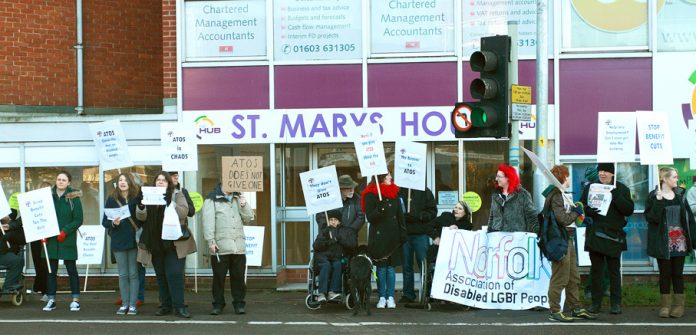
DISABILITY Rights UK yesterday welcomed the report published by the parliamentary Public Accounts Committee on the Work Capability Assessment.
The MPs found that the Work Capability test is causing fear and distress and is not accurate enough.
Controversial assessments run by Atos on behalf of the Department for Work and Pensions should be scrapped and the work brought back in-house, the Public and Commercial Services union says.
The union also criticised the committee for blaming the lack of ‘a competitive market for medical assessment providers’.
The key problem is not Atos’s monopoly, it is that the policy’s primary aim is to remove vital benefits from some of the most vulnerable people in society, and that spending cuts and the profit motive are driving decisions.
If companies were allowed to operate in a competitive market the quality of assessments would suffer even further in the race to cut costs to win contracts and make profits.
Instead, the government should scrap the work capability assessment, bring the work back in-house and establish a fair, humane and inclusive system of assessing people who are entitled to benefits, alongside proper investment to create sustainable jobs and training opportunities.
A House of Commons motion – submitted by the chair of PCS’s parliamentary group John McDonnell, and currently the eighth most supported among MPs with 118 signatures – ‘applauds the British Medical Association call for the Work Capability Assessment to end immediately’.
PCS general secretary Mark Serwotka said: ‘These assessments are cruel and inhumane, and have been shown not to work. But the answer is not to throw the doors open to more private companies.
‘Instead of targeting sick and disabled people in this way to simply cut the welfare bill, the government should scrap the assessments, bring it in-house and work with us and other advocates to set up a system that works with and for people, not against them.’
Disability Rights UK Chief Executive Liz Sayce said: ‘We welcome the fact that a cross-party committee of MPs agrees with what disabled people have been saying so strongly.
‘Fear does not help job seeking. People out of work for many years need encouragement and support to build confidence.’
The committee found 38 per cent of appeals succeed, with a third of those successful appeals involving no new evidence.
There is no evidence that this test predicts whether someone can or cannot work, stressed Disability Rights.
On value for money, the committee says government could make more use of sanctions in its contract management to incentivise Atos getting it right first time.
Liz Sayce added: ‘The millions spent on appeals would be far better spent on personalised employment support that works for each individual.’
She went on to warn: ‘We see more problems ahead. Disabled people are amazed that the largest part of the new PIP assessments will be carried out by the same company criticised by the Public Accounts Committee.
‘We are concerned that from October disabled people deemed fit for work may be placed on JSA while they consider an appeal.
‘And most of all we are concerned about the cumulative effect of cuts in benefits, housing benefits and social care – on a group of people already twice as likely to live in poverty than non-disabled people and facing huge disadvantage and isolation.’